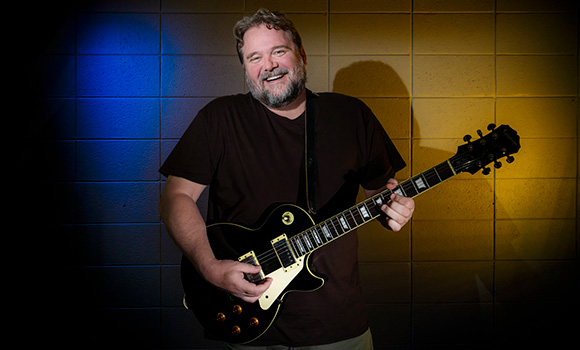The spark for Dr. David Kauzlarich’s next book came as he observed the Occupy movement in St. Louis in 2008.
“It seemed like almost every other person had an acoustic guitar, and almost every other night there’d be bands out there if the cops didn’t break it up,” he says. “It was as much a part of the message, it seemed, as when people had the bullhorn.”
The combination of music and protest against misdeeds of the powerful blended two of his primary interests – scholarly and personal.
“Music can foster and represent political and ideological challenges to structural conditions in society.”
Kauzlarich came to UNC Greensboro in 2017 to head the Department of Sociology. His academic career has focused on criminal justice and criminology, and he has coauthored a number of books, including “Crimes of the Powerful” and “Towards a Victimology of State Crime.” He concentrates his work on crimes such as human rights violations, illegal wars, and anti-democratic practices against journalists. Kauzlarich was drawn to the Occupy movement for that reason.
“I started looking at resistance to perceived state and corporate wrongdoing, ethical issues, disproportionate coddling of corporations – the ’08 housing scandal, Bank of America, and all that,” he says. “The literature in criminology really didn’t have a lot to say about how people resist that through social movements.”
His book in progress is called “Theorizing Resistance: Music, Politics, and the Crimes of the Powerful.” The focus is punk rock and how, Kauzlarich says, music can spotlight and spur resistance to crimes at a state level. He is the first criminologist to examine connections between music and resistance to high-level crimes, he says, though detractors may question whether music can produce political change.
His background helped him launch the research for the book. Kauzlarich has written songs and played in punk bands himself, including the St. Louis band Resoldered. He began the process by interviewing musical peers he shared stages with over the years, then widened his circle. He has interviewed about two dozen musicians from the United States, Canada, and Great Britain.
“Without music that’s counter-hegemonic, or questioning power and authority, we’re left in a vacuous situation, regurgitating these silly pop-culture things,” he says. “That’s why I think these bands are so important, because they show there are other ways to write songs, and there are other ways to think more deeply.”
Kauzlarich came to UNCG following two decades at Southern Illinois University in Edwardsville, where he served six years as a department chair and received the school’s Outstanding Teacher-Scholar Award. Heading the Department of Sociology at UNCG is his proudest academic accomplishment to date, he says.
“As I’ve grown older, what I really care about is making something meaningful for the largest amount of people possible.”
That philosophy may help people outside the academic world appreciate “Theorizing Resistance” and its illumination of the ways music and politics can converge.
“Music can be more than just entertainment,” he says.
This post originally appeared in UNCG Research Magazine. To read other stories about research, scholarship, and creative activity, visit researchmagazine.uncg.edu.
Story by Eddie Huffman
Photography by Martin W. Kane, University Communications



